International Trade and Transport in Zambia, Lusaka, Copperbelt
Business in Zambia: Lusaka, Kitwe, Chipata, Ndola, Lundazi, Petauke

The Republic of Zambia is a Southern African landlocked country
- Lusaka is the administrative, economic and commercial capital of Zambia and the largest Zambian city
- Largest cities of Zambia: Lusaka, Kitwe, Chipata, Ndola, Lundazi, Petauke, Chibombo, Kalomo, Solwezi, Kapiri and Mposhi
- Other Zambian cities are Choma, Katete, Kasama, Mazabuka, Mansa, Kafue, Mumbwa, Chingola, and Mpika
- Borders of Zambia: Angola (Benguela, 1,110 kilometres), Botswana (1 kilometre), the DR Congo (Lubumbashi, 1,930 kilometres), Namibia (233 kilometres), Malawi (Blantyre, Lilongwe, Mzuzu, 837 kilometres), Mozambique (419 kilometres), Tanzania (338 kilometres) and Zimbabwe (797 kilometres)
Zambia economy
The Common Market for Eastern and Southern Africa (COMESA) is headquartered in Lusaka
- Lusaka and the Copperbelt province are the main economic canters of Zambia
- Zambia is an African Frontier Market
- Main Zambian economic activities: mining (copper,
emeralds), agriculture, industry, energy, manufacturing and tourism
- Zambia is the largest cobalt and copper African exporter
- 20% of the world's emerald production
- Main crops: corn, mixed beans, rice, sorghum, soy, sunflower, sweet potato and wheat
- Zambia is one of the most urbanized countries in Sub-Saharan Africa
Logistics and Transportation in Zambia
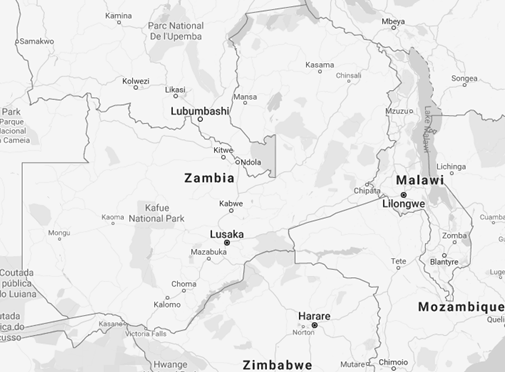

Trade and Business Organisations (Zambia)
- Common Market for Eastern and Southern Africa (COMESA)
- U.S.-COMESA Agreement
- Southern African Development Community (SADC)
- COMESA-EAC-SADC Agreement
- SACU
- Conference on the Great Lakes Region
- Great Lakes Region
- Commonwealth
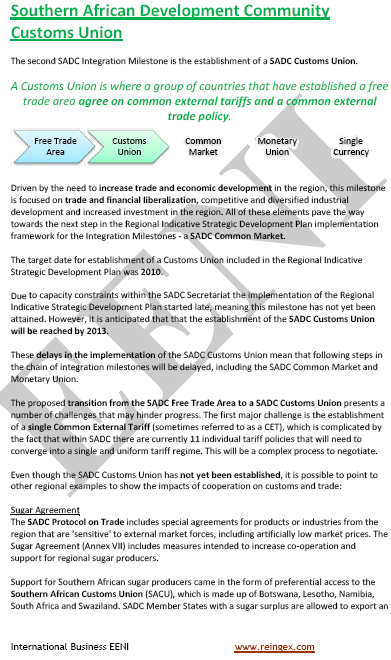
- African Development Bank
- African Union
- AUDA-NEPAD
- Economic Commission for Africa
 Zambian Students
from Zambia
Zambian Students
from Zambia


More information: International Trade and Business in Zambia, at EENI Global Business School Website.
Monique Katebe Musonda (Zambian businesswoman)
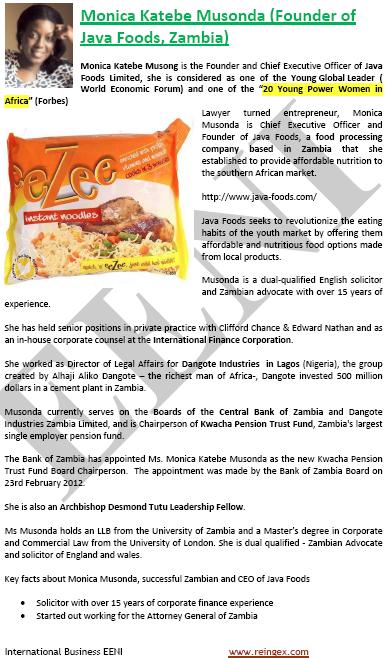
Zambian population: 16.6 million inhabitants
- Population density of Zambia: 17.2 inhabitants / km²
- 1963: 3.5 million inhabitants
- 2000: 9.9 million inhabitants
- 2010: 13 million inhabitants
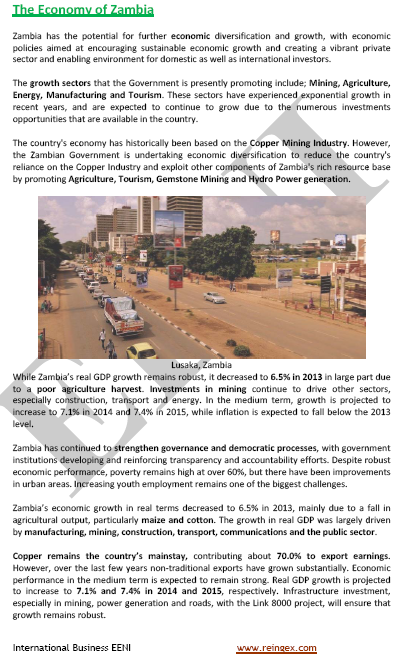
- Climate of Zambia: tropical
- Area of Zambia: 752,618 km²
- Two large river basins:
- The Zambezi / Kafue basin in the centre, west and south (75% of Zambia)
- The Congo Basin in the north (20% of Zambia)
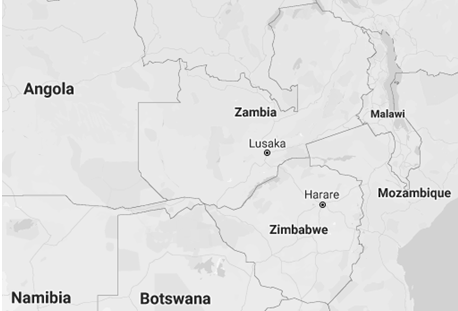
- Zambia is a Republic
- Independence from the United Kingdom: 1964 (History of Zambia)
- 1911 - 1964: Northern Rhodesia
- Zambia = from Zambezi river
- Calling code of Zambia: 260
- Code top-level domain of Zambia: .zm
- Currency of Zambia: Zambian Kwacha (ZMW)
The ten provinces of Zambia are:
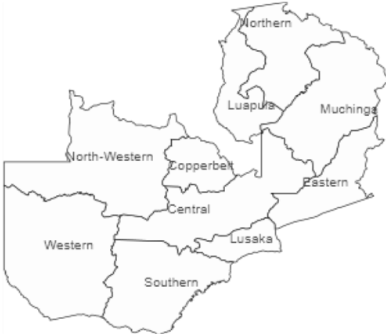
Province / capital / Area (km²) / population (million inhabitants):
- Central / Kabwe / 94,394 / 1.3
- Copperbelt / Ndola / 31,328 / 2
- Eastern / Chipata / 51,476 / 1.6
- Luapula / Mansa / 50,567 / 0.9
- Lusaka / Lusaka / 21,896 / 2
- Muchinga / Chinsali / 87,806 / 0.7
- North-Western / Solwezi / 125,826 / 0.7
- Northern / Kasama / 77,650 / 1.1
- Southern / Choma / 85,283 / 1.6
- Western / Mongu / 126,386 / 0.9
Zambian ethnicities:
The Zambian population is composed by 73 ethnic groups, most of them are Bantu.
90% of Zambians belong to nine main ethno-linguistic groups: Nyanja-Chewa, Bemba, Tonga, Nkoya, Lunda, Luvale, Kaonde, Tumbuka and Lozi.

Religions and Global Business -
Religious diversity
Religions in Zambia
-
Christianity (75% of the Zambian)
- Protestants
- Catholics
- African Traditional Religions
Zambia is officially a Christian nation according to the 1996 Constitution
Languages of Zambia
The official language of Zambia is English
- Bemba: 34% of the population
- Nyanja: 15% of the population
Main languages in:
- Lusaka: Nyanja and Bemba.
- Copperbelt: Bemba and Nyanja
Other Zambian languages are Tonga (12%), Lozi, Kaonde and Lunda


 Tweet
Tweet


